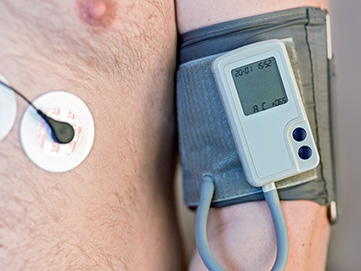Services »
Miscellaneous » Ambulatory Blood Pressure Monitoring
General Overview

Ambulatory Blood Pressure Monitoring (ABPM) is a completely painless advanced technique that more accurately measures the patient’s blood pressure than traditional methods. Some patients experience temporary increased blood pressure levels when they visit the doctor. Ambulatory Blood Pressure Monitoring avoids this problem. The patient performs his or her routine activities over a 24-hour period.
The National Institute for Health & Care Excellence (NICE) suggests that patients with blood pressure readings of 140/90 mm Hg or higher receive ambulatory blood pressure monitoring. The process can be used to confirm the patient’s hypertension.
For patients with poorly-controlled hypertension and/or suspected resistance to blood pressure management medications, ABPM is a diagnostic tool. Patients who develop pregnancy-related hypertension or those considered at high-risk for complications related to hypertension benefit from ABPM.
Diabetic patients or individuals with certain cerebrovascular disease, patients with systolic hypertension, and kidney transplant patients all benefit from the improved potential to identify and diagnose high blood pressure.
How It’s Done
This 24-hour blood pressure measurement uses a digital machine attached to the patient’s upper arm. The APBM device records blood pressure numbers during each 20 to 30 minute interval in the daytime and each 30 to 60 minute interval at night over a 24-hour day.
The unit’s monitoring of blood pressure starts with the inflation and decreasing pressure of the cuff, Patients should keep a diary to note waking activities performed. The patient should include bedtime and rising time in the diary.
Any Side Effects:
ABPM is a non-invasive and simple technique used to provide accurate blood pressure readings over a 24-hour period. There are no side effects.
Next Steps
When a patient receives a high blood pressure diagnosis, he or she is advised to make lifestyle changes such as:
- Avoid smoking or use of any tobacco products.
- Lose weight if you’re overweight.
- Exercise regularly.
- Eat a healthy diet that includes lots of fruits and vegetables and is low in fat.
- Limit your sodium, alcohol, and caffeine intake.
- Try relaxation techniques.
Contact Us
Heart and Vascular Clinic treats patients suffering from heart and vascular disease. Our experienced team is here to help you. We start with accurate blood pressure level information. Contact us at (302) 338-9444 to make an appointment today.
 Ambulatory Blood Pressure Monitoring (ABPM) is a completely painless advanced technique that more accurately measures the patient’s blood pressure than traditional methods. Some patients experience temporary increased blood pressure levels when they visit the doctor. Ambulatory Blood Pressure Monitoring avoids this problem. The patient performs his or her routine activities over a 24-hour period.
The National Institute for Health & Care Excellence (NICE) suggests that patients with blood pressure readings of 140/90 mm Hg or higher receive ambulatory blood pressure monitoring. The process can be used to confirm the patient’s hypertension.
For patients with poorly-controlled hypertension and/or suspected resistance to blood pressure management medications, ABPM is a diagnostic tool. Patients who develop pregnancy-related hypertension or those considered at high-risk for complications related to hypertension benefit from ABPM.
Diabetic patients or individuals with certain cerebrovascular disease, patients with systolic hypertension, and kidney transplant patients all benefit from the improved potential to identify and diagnose high blood pressure.
Ambulatory Blood Pressure Monitoring (ABPM) is a completely painless advanced technique that more accurately measures the patient’s blood pressure than traditional methods. Some patients experience temporary increased blood pressure levels when they visit the doctor. Ambulatory Blood Pressure Monitoring avoids this problem. The patient performs his or her routine activities over a 24-hour period.
The National Institute for Health & Care Excellence (NICE) suggests that patients with blood pressure readings of 140/90 mm Hg or higher receive ambulatory blood pressure monitoring. The process can be used to confirm the patient’s hypertension.
For patients with poorly-controlled hypertension and/or suspected resistance to blood pressure management medications, ABPM is a diagnostic tool. Patients who develop pregnancy-related hypertension or those considered at high-risk for complications related to hypertension benefit from ABPM.
Diabetic patients or individuals with certain cerebrovascular disease, patients with systolic hypertension, and kidney transplant patients all benefit from the improved potential to identify and diagnose high blood pressure.
